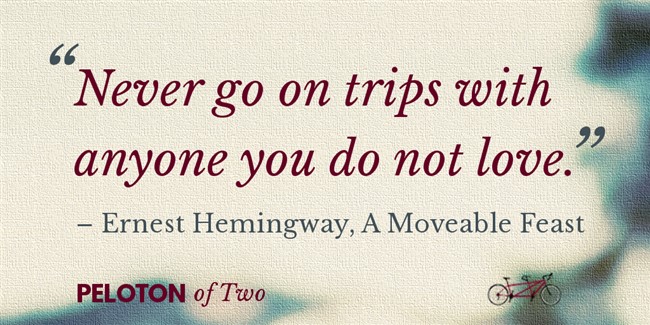Journeys don’t always work out the way we think they will. When F. Scott Fitzgerald invited Ernest Hemingway on a short trip from Paris to Lyon, Hemingway jumped at the chance. Fitzgerald was the more established novelist at the time and Hemingway saw it as a chance for two writers to spend some agreeable time together.

Fitzgerald’s plan was that they would meet at the Gare de Lyon in Paris and take a train down to Lyon. There, they would have dinner and stay overnight at a hotel. Next day, they would collect Fitzgerald’s car from a garage and drive it back to Paris. Fitzgerald insisted he would pay for everything.
Things went wrong right from the start. At the Gare de Lyon, Hemingway looked everywhere for Fitzgerald but couldn’t find him. Assuming he must already be on the train, Hemingway jumped aboard as it departed. He searched the train without luck and realised he was now travelling alone and at his own expense to Lyon.
Writing about it in A Moveable Feast, Hemingway said, ‘In those days I had a very bad, quick temper, but by the time we were through Montereau it had quieted down … Later I was delighted that I had used up the anger at the start and gotten it over with. It was not a trip designed for a man easy to anger.”
In Lyon, there was no sign of Fitzgerald. But it wasn’t an entirely wasted trip. Hemingway met and had dinner with a man who breathed fire and bent coins for a living. It was just the sort of encounter he could be expected to have.
Fitzgerald arrived at Hemingway’s hotel the next morning. When they eventually collected the car, Hemingway was astonished to find that it had no top over the passenger compartment. This had been damaged when the car was unloaded in Marseilles and Zelda Fitzgerald had ordered that it be cut away. It had never been replaced.
The drive back to Paris was interrupted a dozen times by heavy rain. Neither man had brought waterproofs and they were forced to shelter under trees or in cafes. They drank heavily throughout the day, and this seemed to have a greater effect on Fitzgerald.
Eventually they took rooms at a hotel and spent most of the evening arguing over whether Fitzgerald was dying of congestion of the lungs. Fitzgerald felt that he was. Hemingway insisted that he wasn’t. Hemingway was right, but his suggested remedy of whisky and lemonade only seemed to make the patient worse.
The remainder of the story is told in great detail in A Moveable Feast. The lesson Hemingway took from the whole experience was: ‘Never go on trips with anyone you do not love.’
This is one of my favourite travel quotes. And it describes exactly how Catherine Pringle, the heroine of Peloton of Two, comes to feel as she struggles around France on a tandem tour with two men.
Catherine shouldn’t be with one of them. Perhaps she shouldn’t really be with either of them. But the alternative, travelling alone, isn’t something she wants to do unless she really has to.
There’s no mention in A Moveable Feast of the two writers travelling together again. They saw plenty of each other in Paris. But their relationship clearly didn’t pass Hemingway’s golden rule of only travelling with those you love.